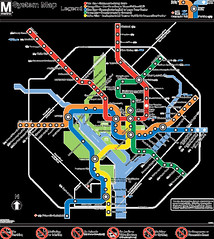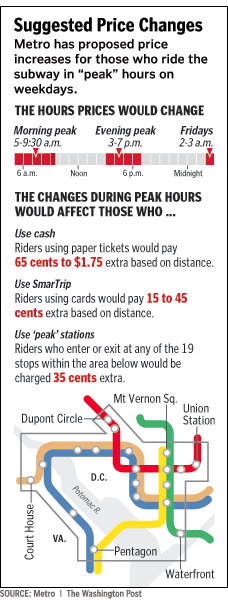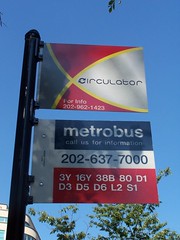What do we do about funding our transit system? (Updated)

---------------
This blog entry has been updated with a link to a Post article about fare increase proposals, the addition of a Post graphic summarizing the proposals, and an updating of how I think a station-specific surcharge could be executed in a way that doesn't penalize residents. (Even though I am still not sure how I feel about this concept generally.)
---------------
As Washington-area residents know, the newspapers have been full of coverage all week about proposals to raise fares for the WMATA transit system in the Washington region, due to an expected budget shortfall of almost $120 million. And I haven't written about it, mostly because I am still working out my thinking about it, the various proposals, and ideas for reengineering services and systems. One of the articles is "Rush-Hour Metro Fares May Rise as Much as $2.10," subtitled "Broad Plan Aims To Reduce Deficit, Improve Service," from the Washington Post.
On the Columbia Heights e-list, Marcus Popetz wrote something that is getting me started. He wrote (in response to a statement by Councilmember Graham, who serves on the WMATA Board of Directors, calling for a variety of budget reductions before raising fares):
[If you look at the Metro Budget], see chart on page 5, how is it that DC has the fewest number of riders yet we shoulder more than 1/3 of the cost of running Metro?
Seems to me the board should recalculate it's numbers based on constituents served and get more money from VA/MD to cover the shortfalls.
Otherwise the DC resident is paying more per mile to ride metro than the MD/VA rider and that doesn't really seem fair now does it?

And I responded:
The funding scheme is based on the number of stations in each jurisdiction. DC has 40 stations--out of 86 stations total. I agree with you that this method isn't fair. DC has more desireable destinations (i.e., places to work) that suburban residents want to go to. The funding scheme needs to be better balanced and build the overall funding method in a weighted fashion that also charges jurisdictions based on where users come from--especially during peak times.
I really hate the proposal to assess a surcharge during peak for certain high demand stations in DC. This strikes me as yet another imposition on DC residents that favors suburbanites. Residents are likely a small portion of the total demand during peak hours for for the high-demand stations.
For example, Union Station is heavily used during peak periods by VRE and MARC riders switching to/from the subway system. Why should someone who walks to the station because they live in the neighborhood be additionally assessed to further subsidize suburbanites?
The way to handle this is to assess the surcharge differently. During morning rush, people who exit in the high demand stations would be assessed the surcharge, not the people who enter. In the evening it would be reversed, people who enter the high demand stations would be assessed the surcharge, not the people who exit. But I still don't like the idea.
While Virginia and Maryland jurisdictions do pay towards the WMATA compact, many train commuters are from jurisdictions outside of the Compact. (Technically, MTA pays the PG and MoCo shares of the Compact, but that money still comes out of those counties transportation allocations from the State of Maryland. Riders coming to DC jobs from Baltimore or Harpers Ferry or Fredericksburg or wherever are not paying for the system in the same way that jurisdictions in the Compact are paying.)
Even though the design of the Dulles extension is flawed; it should have been done by WMATA, and also looked at as an opportunity to fund tunnel expansion across the river, and could have been routed separately from the blue-orange line across the Potomac into DC providing service to Georgetown, with an underground "Farragut Central" station in between Farragut North and Farragut West to provide a link across these lines, and could then have been directed down K Street to create the suggested separate in-city blue line proposed around 2002--necessary to add capacity (and redundancy) in the center city--and none of this was done because the ideologically driven transit planning in Virgina doesn't take into consideration broader WMATA "system" issues; at least it will mean that as stations open, Virginia jurisdictions will start having to pay more money.
 The Montgomery County Ride On bus system is one of the more successful "suburban" bus systems in the U.S. It carries more riders in Montgomery County than WMATA buses. Photo from BeyondDC.
The Montgomery County Ride On bus system is one of the more successful "suburban" bus systems in the U.S. It carries more riders in Montgomery County than WMATA buses. Photo from BeyondDC.P.S. in regard to Councilmember Jim Graham's excellent position paper, I have something that is difficult to say. I support unions and I think that unions help create and maintain jobs at wage rates that allow workers to have a quality life. However, the union contracts for certain transit personnel are not fair to all of us as residents, transit system users, and taxpayers.
1. Seniority determines overtime shift choices. Drivers nearing retirement tend to work a lot of overtime during their last 3 years of service because earnings over the last three years of work determine pension rates. This is a gaming of the system that is expensive to everyone.
2. One bus garage has a different union than the others, and this means that drivers represented by the other union can't work there. This drives up overtime costs (and ultimately the pension costs) at that division.
WMATA wage rates are the biggest reason that suburban jurisdictions have developed separate bus systems. I believe that the DC Circulator bus system is the first route offered in DC outside of the WMATA union bus contract.
The Union ought to be able to see that maintaining these provisions will likely doom the provision of bus services provided by WMATA. E.g., the budget proposal up currently calls for dropping certain WMATA services. Often times, in the suburbs, the local bus systems pick up or extend service to cover such reductions, further reducing the use of WMATA unionized employees.

Index Keywords: transit



0 Comments:
Post a Comment
<< Home